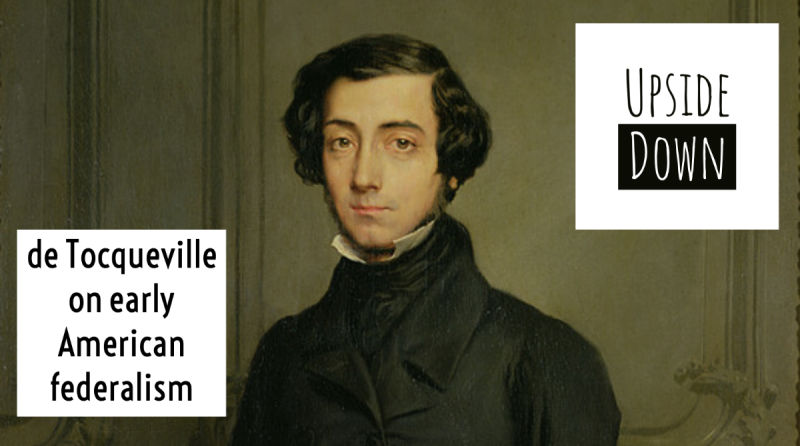14th July 2011 | By Simon Duffy
Alexis de Tocqueville observes that early American federalism assumed one starts with the small and builds to the large and it was based on religious and moral principles.

In America, on the contrary, it may be said that the township was organised before the county, the county before the state, the state before the union... The law enters into a thousand social wants that even now very inadequately felt in France.
But it is the mandates relating to public education that the original character of American civilisation is at once placed in the clearest light. "Whereas," says the law, "Satan, the enemy of mankind, finds his strongest weapons in the ignorance of men, and whereas it is important that the wisdom of our fathers shall not remain buried in their tombs, and whereas the education of children is one of the prime concerns of the state, with the aid of the lord..." Here follows clauses establishing schools in every township and obliging the inhabitants, under pain of heavy fines, to support them. Schools of a superior kind were founded in the same manner in the more populous districts. The municipal authorities were bound to enforce the sending of children to school by their parents; they were empowered to inflict fines upon all who refused compliance; and in the cases of continued resistance, society assumed the place of the parent, took possession of the child, and deprived the father of those natural rights which he used to so bad a purpose. The reader will undoubtedly have remarked the preamble these enactments: in America religion is the road to knowledge, and the observance of divine laws leads man to civil freedom.
Alexis de Tocqueville from Democracy in America (1835)
De Tocqueville notices some very interesting features of the early American social and political system.
There is first the genuinely 'federal' character of early American political organisation. Authority is seen to lie in citizens, then towns, counties and then it moves upwards to the state and the union.
Yet he also observes that, at that time, American society was not individualistic nor anti-social. To de Tocqueville it was extraordinarily social: the desire to do good and to attend to "social wants" is everywhere.
The paradox is that ambitious social concern combined with a federal and legalistic society lends itself quite naturally to demanding a state that can increasingly interfere with individual liberty. By the standards of the time, America was certainly a nanny socialist state. Perhaps its current liberalism is a reaction against this early enthusiasm.
However, some resolution to this paradox is found in the role played by religion in early American life. While tolerating diversity of religious practice, American society seems bound together in a shared moral concern for each other that is religious rather than liberal. However this is counter-balanced by a distinctively protestant concern for the liberty of the individual soul. The notion that any citizen can be sacrificed for the sake of the collective would be profoundly problematic for such a protestant country.
Today we are more sanguine about sacrificing the individual for the collective. Mechanisation, atomisation and the erosion of moral and religious feeling all encourages a sense that we are just all part of some vast machinery of need and production and that our role is simply to play our part and to try and squeeze out for ourselves whatever share of the social product we can manage.
If we are not careful citizenship stops being the foundation stone for a just society - instead it simply becomes a way of flattering us into accepting our role as mere subjects of the state.